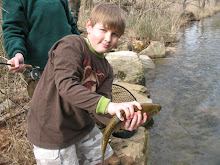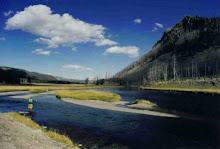
"There he stands, draped in more equipment than a telephone lineman, trying to outwit an organism with a brain no bigger than a breadcrumb, and getting licked in the process."
~by Paul O'Neil, 1965~
Fly fishing through the various seasons and changes can be a challenging endeavor, especially if your goal is to catch fish..... In my line of work I see on a daily basis folks get in the water, immediately start casting, sloshing through the water, making noise....all while not once observing the state of the water they have just entered. The way I see it, it is almost like they are attacking the river. Fishing the water rather than fishing with purpose.....to the fish. Here are some ideas/tips that might help you enjoy success astream during the dog days of summer and into fall- - - which with low water can be a challenging time to catch fish.
There are two approaches to fly fishing, both can work at certain times of the year, but only one usually works this time of year. Let me explain.... if I may...
One approach is what I call run and gun or shot gunning. The person has tied on a fly he thinks should work, steps into the water, and immediately starts casting. Casting here, casting there, long, short, and all lengths in between. He sees a rising fish and casts to it...maybe once, twice, three times, then moves on. If another fish rises, he casts to that one. He changes flies once, twice, or many times....and more often if he's not getting any action. I am convinced folks do this because at times it does work. Late winter/early spring when the water is up, the fish aren't spooky, they are looking to eat, and fishing the water will produce fish. The trouble comes though, when one has been successful with this approach and then several months later steps into the same river, does the same thing as before, and gets a much different result. So what changed? The answer? Everything and change everything. The conditions are different, the water is lower and clearer and the fish are spooky. Different flies are hatching now, unlike the larger bugs of spring. Also, the fish have been hammered by fishing pressure all spring and they are leader shy and will easily spook. I see the above scenario over and over and over and get emails and calls about it , and folks ask 'I did everything I usually do and no fish, not even a strike". And I think to myself, you just indentified the problem with your question...everything.
Enter the second approach: A careful, intentional, focused approach that takes into account the following:
1) conditions have changed, and challenging conditions require discipline. Stop casting constantly, and false casting so much .....false casting everywhere is spooking fish.
2) Use the right flies, not as many bugs hatching right now so use small flies and terrestrials.
3) Use the shortest casts you can get away with, knowing that a shorter cast lands over fewer dissimilar currents and is easier to manage...and you won't spook fish with constant line mends to keep the fly drifting properly.
4) Use specialty casts - curves, reach casts, etc., to get good drifts. If you don't know these, learn them. They are valuable casts to add to your bag of tricks.
5) Overall, cast less and observe more. Look at those spider webs along the bridge or trees where you got into the river....whatever bugs have been hatching will get caught there ...spiders will be eating them too.
6) Watch where you walk and get into the water, and also only wade if necessary. Take care not to make a splash or wake. Summer trout and smallmouth love margin areas of a stream because that is where overhangs are and where bugs fall in....beetles, ants, inchworms, you name it.
7) Don't overlook skinny water (only inches deep)- - -You will catch fish in skinny water - - - edges, banks, tailouts of long pools......these fish are easy to catch if you don't spook them first....as they are in shallow water to do one thing....EAT. If you see a fish that is spooked coming from behind you you aren't wading quietly enough. This season, to date the largest dry fly fish caught on any of our trips was a 23" male brown trout that was in less than 10 inches of water.....on a bank, in a spot exactly like I have described above.
8) Water can warm excessively in the summer. Fish with a thermometer and if you find water approaching 70F or more and you are fishing for trout, fish else where. Going upstream is one option. Water temps near 70F the fish become lethargic and often can't be revived if caught and handled. Optimum temperatures are 55-60F for most trout species. Smallmouths low to mid 70sF.
9) Wear natural clothing that allows you to blend in. Bright colors spook fish, wear earth tones, drab clothing etc. Once fish are spooked its too late.
10) Use appropriate gear, from wading stuff (wet wading) to rods (a lighter rod, maybe a 3wt instead of a 5wt), and rigs (dry fly with a dropper nymph instead of a big strike indicator and two huge split shot). Using appropriate gear with help you avoid disturbing the water any more than is necessary.
11) Have plenty of attractors, terrestrials, and small patterns. In summer, other than the occasional sulphur or Cahill , most natural bugs are small ( like #20-24 Blue Winged olives, #22-24 blackflies). A well stocked terrestrial box is always a good idea, as trout fill in the gaps in their caloric intake with these food items.
12) Keep a low profile, don't get on a high rock or bank and try to spot fish and then fish to them as they can or will see you and will flee in terror.
13) Stalk fish or the spot, get into position carefully, then present the fly to that fish or spot. This works better than willy nilly firing a thousand casts over the water in hopes of getting a strike.
14) Pay attention to a foam line, bubble line, debris line.....with the reduced flow/volume of summer trout use these 'lines' to feed as the line is a conveyor belt that brings food into the location.
15) Lastly, don't forget bug repellent and sunscreen. If you use deet, don't get it or sunscreen on your line, rod, or flies, as it can damage gear and fish can smell the stuff. Neutrogena makes a fantastic sunscreen product. I like the SPF70, and to keep it off your stuff use the back of your hand to apply it.
Hope these tips help you in your summer fishing......Good fishing!



























1 comment:
"The way I see it, it is almost like they are attacking the river." Great quote and it is so true. I'm guilty of this many times. Also the I used this fly and fished this way last time and it worked. It is really hard to make yourself change everything that worked the time before but many times I have been rewarded.
Post a Comment